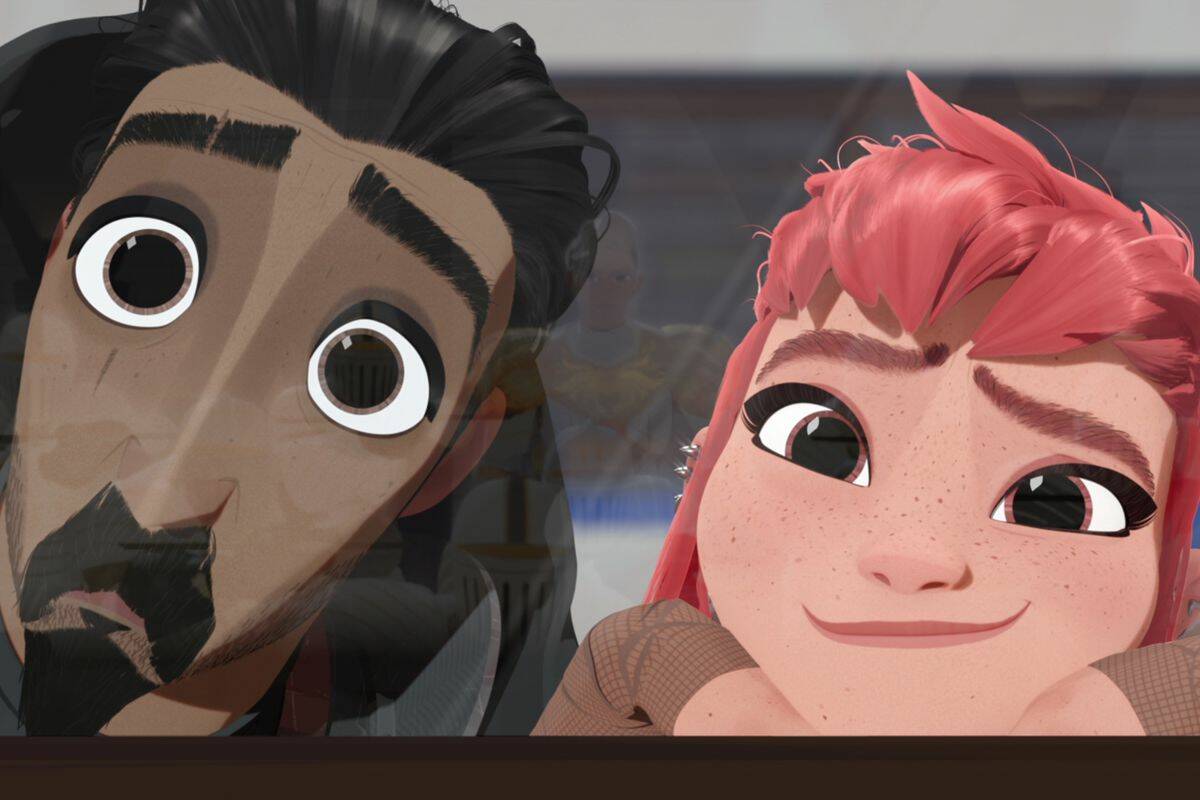In a futuristic fantasy setting, two unlikely allies are forced together — a heroic knight framed for murder and a shape-shifting child looking for revenge against a cruel world.
“Why are you helping me?” Riz Ahmed’s Ballister Boldheart asks.
“Everybody hates you too,” responds Chloë Grace Moretz’s titular Nimona.
“Nimona” was released last week on Netflix by Annapurna Pictures, an adaptation of a webcomic that began on Tumblr in 2012. It’s a charming buddy comedy that tackles strangely prescient and timely themes of challenging the way things are and celebrating individuality.
Ahmed’s Ballister is the first “commoner” not descended from a noble family to earn knighthood in a fantasy kingdom with flying cars, cell phones and nachos. The Queen champions him and seeks to tear down tradition. She says “anyone can be a hero.”
During the knighting ceremony, the Queen is killed — Ballister framed for the act.
On the run, he is approached by Nimona, voiced by Chloë Grace Moretz, a shape shifter, a “monster” who can become a variety of animals including a rhino, a whale, and a mouse. Seeing the wanted posters, she initially believes Ballister to be a cruel villain and wants to be his sidekick.
The two become an odd but compelling pair, a noble knight defamed and an affable anarchist who transforms into animals. They bond over their shared ostracism from society. By day, they work to clear Ballister’s name; by night, they spend time together in the hideout, dancing and playing board games.
Along the way, Ballister also struggles to navigate his strained relationship with another knight, his boyfriend, Ambrosius Goldenloin. Their relationship has been on rocky shores since Ambrosius cut off Ballister’s arm and began hunting him for the murder of the Queen.
“Nimona” is largely standard animated fare — twists predictable and themes worn on the sleeve. But I found it charming, inventive and fun. It transcended its trappings to be something special because of the genuine emotion it channels through Ballister and Nimona, a weight borne by Ahmed and Moretz in stellar performances.
At its heart is a story about challenging tradition and society — asking who systems are really serving. The villain’s motivation is explicitly “protecting our way of life.” Ballister and Nimona, our heroes, face prejudice and hardship because they don’t fit into their narrow worldview.
The film celebrates the way they’re different, it says that they shouldn’t bend to fit in.
Ballister asks Nimona why she doesn’t just mask as “normal” by not using her shape-shifting power.
“I’d die,” she says with a laugh. Not literally, but she “sure wouldn’t be living.”
Though that emotional core is certainly the film’s best asset, it also stands out for its snappy editing and imaginative animation. In an early sequence, Ballister steps out of his hideout and into a jail cell, and a brief flashback sequence told as the pair ride a subway train is animated into the tiles of the tunnel wall flying by. Each of Nimona’s various pink-hued animal forms are realized with equal charm but a unique sensibility.
The fantasy world of “Nimona” isn’t groundbreaking, but it’s modern and interesting. Its themes are deeply modern for a story first told a decade ago. It’s a great film coming in under the radar that’s worth a watch.
“Nimona” is streaming on Netflix.
Reach reporter Jake Dye at jacob.dye@peninsulaclarion.com.


